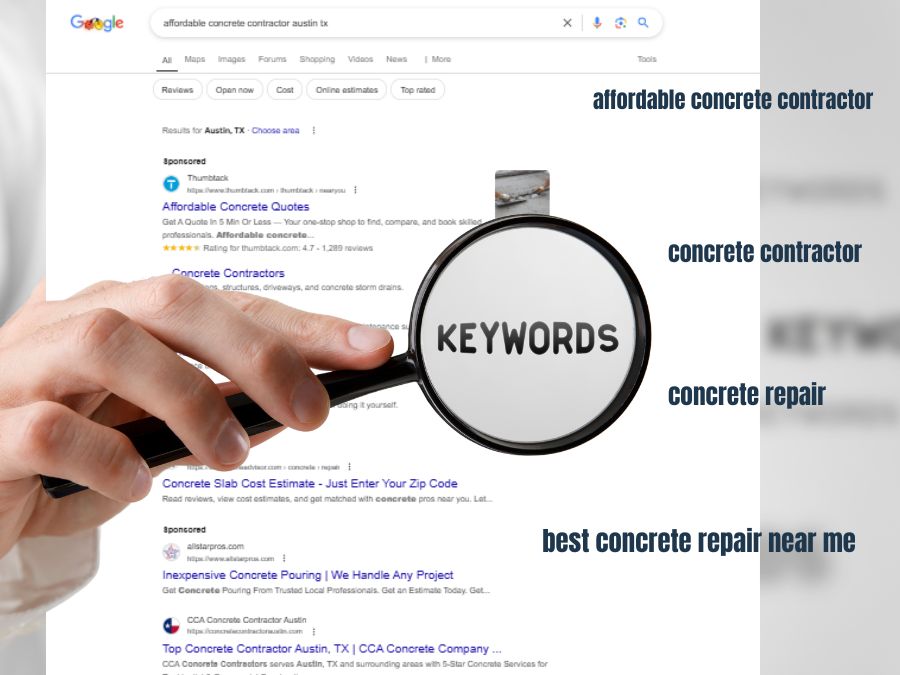Concrete Contractor SEO Guide: How to Boost Your Online Visibility and Generate More Leads
In the digital age, having a strong online presence is no longer optional — it’s essential. As a concrete contractor, you may rely on word-of-mouth referrals or local advertising, but an optimized online presence can take your business to the next level. SEO (Search Engine Optimization) ensures your website ranks higher on Google, helping potential clients find your services more easily.
Unlike paid ads, SEO drives long-term, organic traffic to your website, establishing credibility and trust with local homeowners, builders, and commercial clients. If you’re not appearing on the first page of search results, you could be missing out on countless leads and lucrative contracts. This guide will walk you through the essential SEO strategies every concrete contractor should know.
1. Understanding How SEO Works for Concrete Contractors
Search engines like Google use algorithms to determine which websites appear at the top of search results. They prioritize websites that offer relevant, high-quality content, are mobile-friendly, and load quickly. For a concrete contractor, this means optimizing your site for local keywords like “concrete driveway contractor” or “concrete repair services.”
Search engines look at factors like:
- Content Relevance: Do the pages on your site answer the questions people are searching for?
- Local SEO Signals: Is your business listed on Google Business Profile, and are your name, address, and phone number (NAP) consistent across the web?
- Website Performance: Does your website load quickly, work well on mobile, and provide a great user experience?
By mastering these elements, your business can attract more high-intent customers — the ones actively searching for concrete services in your area.
2. Keyword Research for Concrete Contractors
If you want potential clients to find your business online, you must know the search terms they’re using. Keywords like “stamped concrete,” “concrete patio installation,” and “concrete foundation contractor” are examples of search terms people enter into Google.
To identify the best keywords, you can use tools like Google Keyword Planner, SEMrush, or Ubersuggest. Focus on local intent keywords, as most people search for contractors near them. Instead of broad terms like “concrete repair,” focus on more specific and localized keywords like “best concrete repair near me” or “affordable concrete contractor [your city].”

How to Use Keywords on Your Site:
- Include target keywords in key areas like page titles, headers, and meta descriptions.
- Add keywords naturally to your service pages, blog posts, and homepage content.
- Don’t overstuff keywords. Google may penalize you for “keyword stuffing,” so write naturally and focus on user experience.
3. Optimizing Your Website for Local SEO
Since most concrete contractors serve a specific local area, local SEO is a crucial part of your strategy. Local SEO allows you to target potential customers searching for “concrete contractors near me” or “concrete repair in [your city].”
Here’s how to enhance your local SEO:
- Google Business Profile: Create and optimize your Google Business Profile. Include your business name, address, phone number, service area, photos, and business hours.
- Local Citations: Ensure your company’s name, address, and phone number (NAP) are consistent on all listings, such as Yelp, Angi, and local business directories.
- Online Reviews: Reviews play a big role in local SEO. Encourage happy clients to leave reviews on Google, as they boost your credibility and improve your rankings.
- Location-Specific Pages: If you serve multiple areas, create individual pages for each location, optimizing them with relevant keywords for those areas.
When done correctly, local SEO can help you dominate search results in your target market and bring in more local leads.
4. On-Page SEO for Concrete Contractors
On-page SEO refers to the changes and optimizations you make directly on your website. The goal is to ensure your site is user-friendly, informative, and provides a seamless experience for potential clients.
Here’s how to improve on-page SEO:
- Title Tags & Meta Descriptions: Every page should have a unique title tag and meta description that includes target keywords. This is what users see on Google’s search results page.
- Header Tags (H1, H2, H3): Use header tags to structure your content and make it easy to read. Place your most important keywords in the H1 tag.
- Internal Linking: Link to other relevant pages on your website to keep users on your site longer. For example, link from your “Concrete Driveway Services” page to your “About Us” page.
- Image Optimization: Images should be compressed to load quickly. Add descriptive “alt text” to images, which can also help with SEO.
- Mobile-Friendly Design: More people search on mobile than desktops, so ensure your website looks great on mobile devices.
- Call-to-Actions (CTAs): Add CTAs like “Request a Free Quote” or “Call Us Today” to encourage potential clients to contact you.
5. Off-Page SEO for Concrete Contractors
Off-page SEO involves factors outside of your website that can influence your rankings. This is primarily done through backlinks, reviews, and brand mentions.

How to Improve Off-Page SEO:
- Backlink Building: Get other websites to link to yours. Industry blogs, local business directories, and partnerships with other contractors are good sources of backlinks.
- Online Reviews: Ask satisfied clients to leave reviews on Google, Yelp, and Angi. Not only do reviews help SEO, but they also build trust with potential clients.
- Social Media Presence: Share your projects on social platforms like Facebook, Instagram, and LinkedIn. Social signals, while not a direct ranking factor, help increase brand visibility.
Building a strong off-page SEO strategy takes time, but the results are worth it. The more authority and credibility your website builds, the higher you’ll rank in search engines.
6. Technical SEO for Concrete Contractors
Technical SEO focuses on your website’s backend performance, like speed, security, and mobile-friendliness. If your website is slow, outdated, or hard to navigate, Google may not rank it well.
How to Improve Technical SEO:
- Page Speed: Compress images, enable browser caching, and minimize unnecessary scripts to speed up load times.
- SSL Certificate: Secure your site with HTTPS. Google prioritizes secure websites over non-secure ones.
- Mobile-Friendliness: Use a responsive design so your site adjusts for mobile users.
- Crawlability: Use a clean site structure, so search engines can easily crawl and index your pages.
A well-optimized site ensures visitors have a smooth experience, which reduces bounce rates and increases conversions.
7. Content Marketing for Concrete Contractors
Content marketing is one of the most effective ways to improve SEO for concrete contractors. Blog posts, case studies, and industry news not only showcase your expertise but also give Google more content to rank.
Types of Content to Create:
- Service Pages: Detailed pages for each of your services, like concrete driveways, stamped concrete, and foundation repair.
- Blog Articles: Write articles like “5 Benefits of Stamped Concrete for Your Patio” or “How to Know If You Need a Concrete Repair.”
- FAQs: Address common customer questions about concrete services, which often appear as featured snippets on Google.
Creating high-quality content positions your business as an expert in concrete services, and Google rewards that expertise with higher rankings.
8. Tracking & Analytics
You can’t improve what you don’t measure. Use Google Analytics and Google Search Console to track how much traffic your site is getting, which pages are performing well, and which keywords are driving leads.

Metrics to Track:
- Organic Traffic: How many people are finding your site through search engines?
- Keyword Rankings: Track your position for key search terms.
- Click-Through Rate (CTR): The percentage of people who click on your site after seeing it on Google.
- Conversion Rate: How many visitors become leads or clients?
Regularly review your metrics and refine your SEO strategy based on the data. This process helps you stay ahead of competitors and maximize your online visibility.
Conclusion
SEO for concrete contractors is a long-term investment that can transform your business. By following best practices for on-page, off-page, local, and technical SEO, you’ll position your business to appear at the top of local searches. If you prioritize SEO, your website will generate more traffic, attract high-quality leads, and establish your brand as the go-to concrete contractor in your area.
Start small by optimizing your Google Business Profile, focusing on local keywords, and building out service pages. Over time, as you continue to optimize your site and create valuable content, you’ll see your rankings and leads grow.
If you need help with SEO for your concrete contractor business, consider working with an SEO specialist who can guide you through the process. By taking action today, you’ll lay a strong digital foundation for the future of your business.



